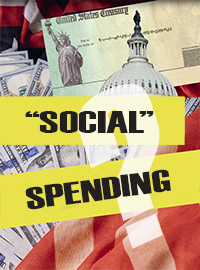| The True Cost of Biden's Agenda |
 |
|
By Byron York
Wednesday, December 15 2021 |
President Joe Biden and Capitol Hill Democrats are racing to pass their massive social spending bill, known as Build Back Better, before Christmas. Maybe they'll succeed, and maybe they won't – a lot depends on whether Democratic Sen. Joe Manchin hops on board. But no one should have any illusions about what BBB, the final piece in the Democrats' COVID-year spending orgy, costs. After a lot of deceptive claims from Democrats, we finally have an answer. Biden has claimed, falsely, that the bill is "fully paid for." But last month, the Congressional Budget Office released an analysis saying BBB would add $367 billion to the deficit over the next 10 years. So much for "fully paid for." But it's much, much worse than that. According to a new assessment from the CBO, the cost of the bill under real-world conditions – that is, if it is ultimately extended for a decade, the way Democrats want – will add not $367 billion to the deficit but $3 trillion. That's more than eight times the deficit spending Democrats are citing. Here's how it works: In order to keep the costs of the bill down, Democrats have inserted a lot of "sunsets" in it – that is, arbitrary dates at which provisions would end. For example, the centerpiece of Build Back Better is the child tax credit, a program under which the government sends monthly checks to families with children, with no requirement that recipients work, or look for work, or anything. It is a new dole, and it has long been a goal of some Democratic policymakers. Democrats want to make it a permanent feature of American life. This year, passing the enormous COVID relief bill, Democrats inserted the child tax credit – but only for a year. Now, there was no way in the world that Democrats believed the country should have a child tax credit for just one year. No, the idea was to pass the bill, get the policy into law, and then renew it year after year. After all, what heartless lawmaker would want to take sustenance and support from children? At this moment, the child tax credit is scheduled to expire on Dec. 31, and Democrats are working frantically to extend it. "It's as important a thing as there is in the Build Back Better bill, and to me it was the most important thing we did in calendar 2021," Democratic Sen. Sherrod Brown said recently. BBB would extend the child tax credit, but only for one more year, until the end of 2022. As a "temporary" measure, the CBO said it would add $185 billion to the deficit. Estimating its cost for just one year keeps the stated overall cost of the bill down. But guess what will happen at the end of 2022? Democrats will say it is absolutely necessary that the child tax credit be extended. And the cost will go up. So Republican Sen. Lindsey Graham and Rep. Jason Smith recently asked the CBO: What would provisions of the bill add to the deficit if they were extended for 10 years, as Democrats originally intended and hope to make a reality? For the child tax credit, the added deficit goes from $185 billion to $1.597 trillion – a huge increase. That's the real cost of just one part of the Build Back Better bill. Graham and Smith asked about other provisions as well. Democrats say child care and preschool subsidies would add $381 billion to the deficit, ending after 2027. But they will actually add $752 billion to the deficit if extended a full decade, as Democrats intend. Democrats say health insurance subsidies will add $74 billion to the deficit, ending after 2025. But they will actually add $220 billion to the deficit for the decade. Increasing the earned income tax credit would add $13 billion to the deficit, ending in 2022. But it would actually add $135 billion to the deficit for the decade, as Democrats intend. You can see what is going on. Using their bare majority in the House and their not-really-a-majority in the Senate, Democrats hope to pass a massive spending bill that is actually far more massive than it looks. The estimated $367 addition to the deficit – which is bad enough – would actually be a $3 trillion addition to the deficit. Whenever you see Democrats estimate the cost of Build Back Better, multiply it by eight or 10, and you'll be getting close. Byron York is chief political correspondent for The Washington Examiner. COPYRIGHT 2021 BYRON YORK |
Related Articles : |
























